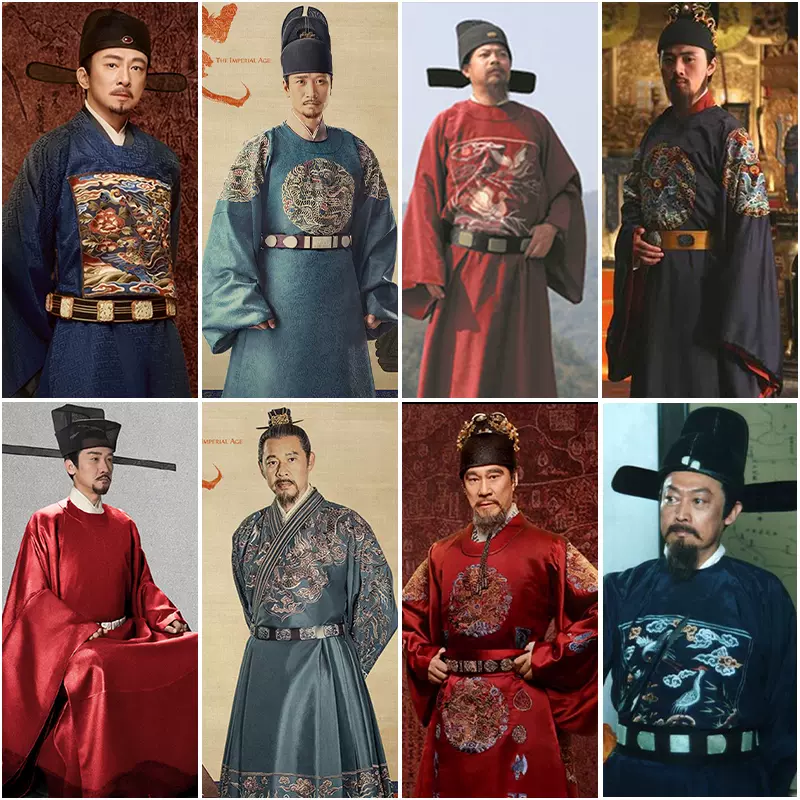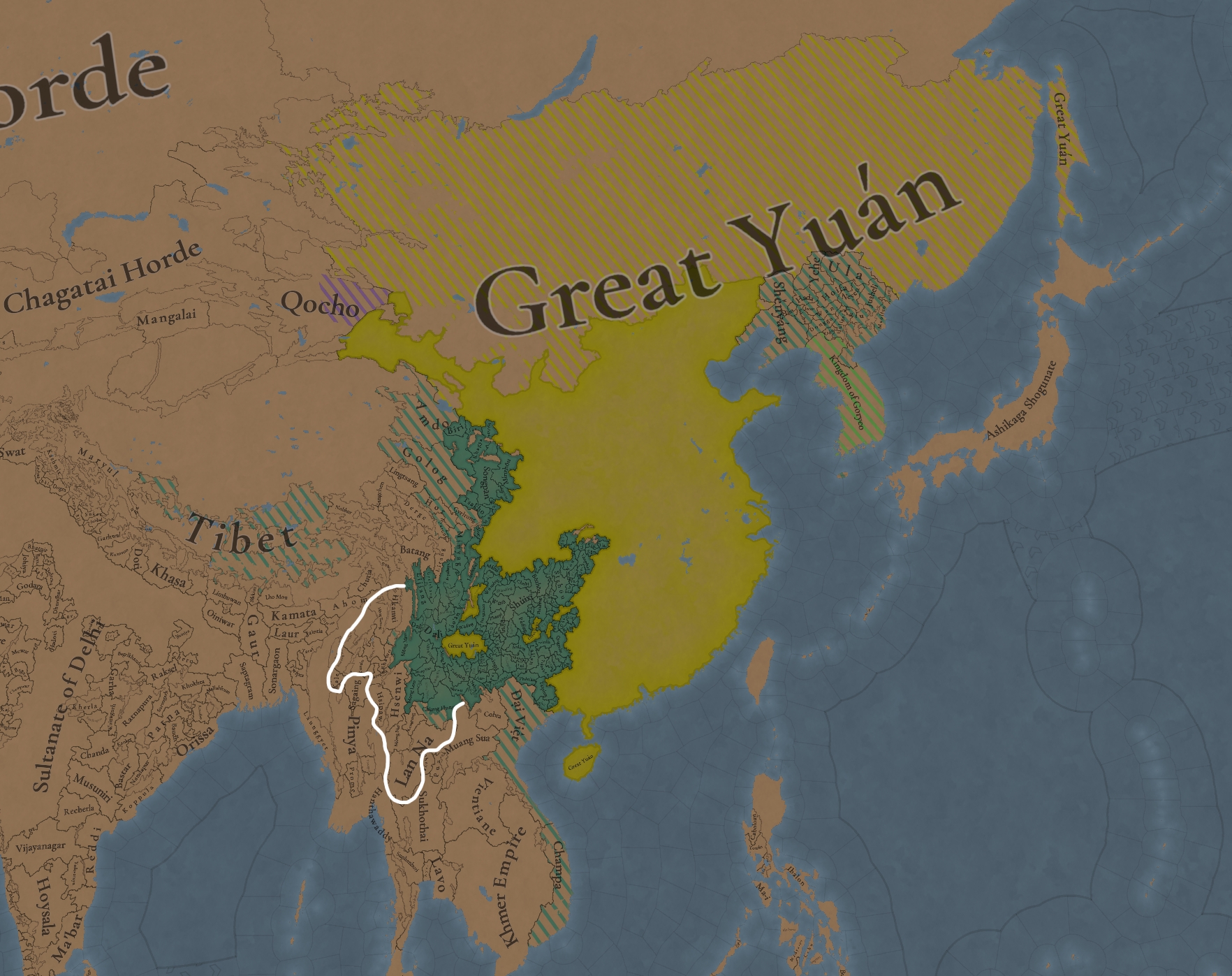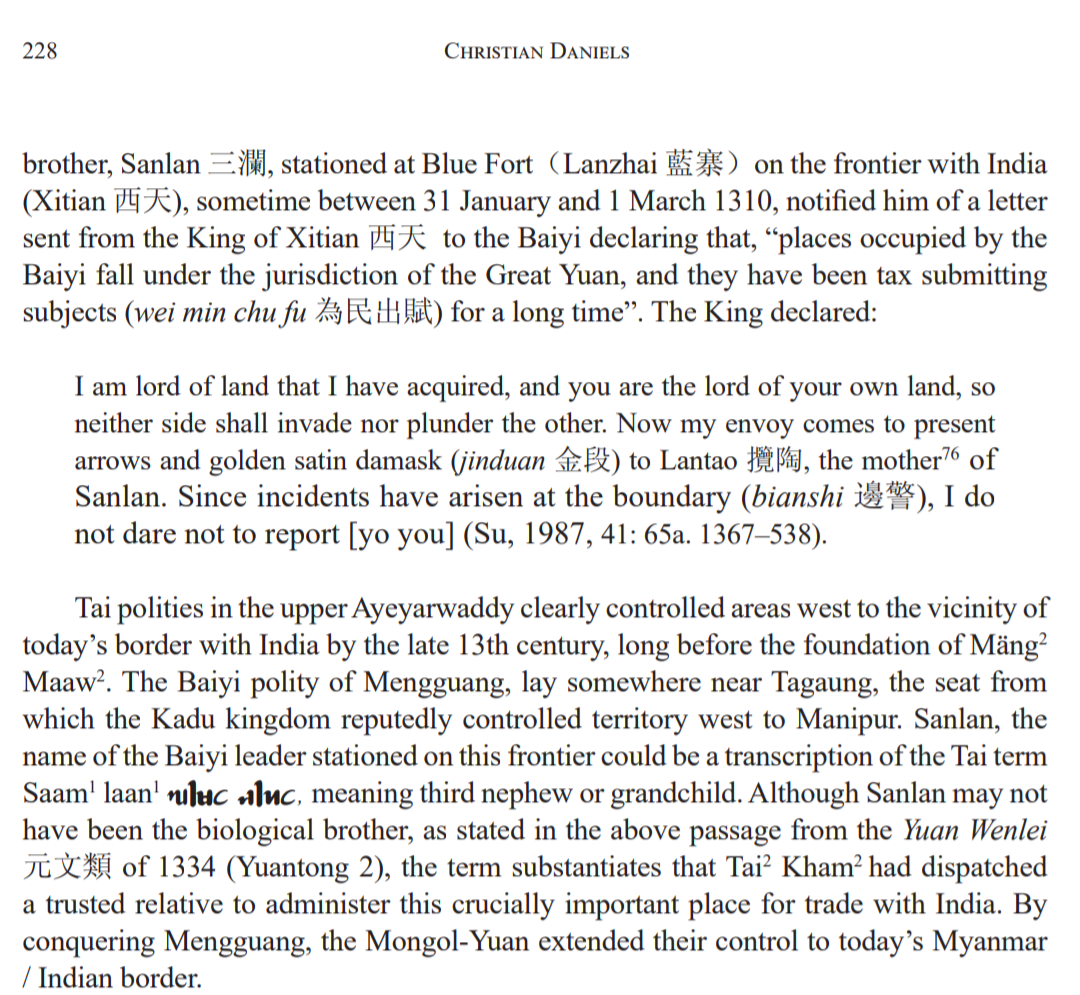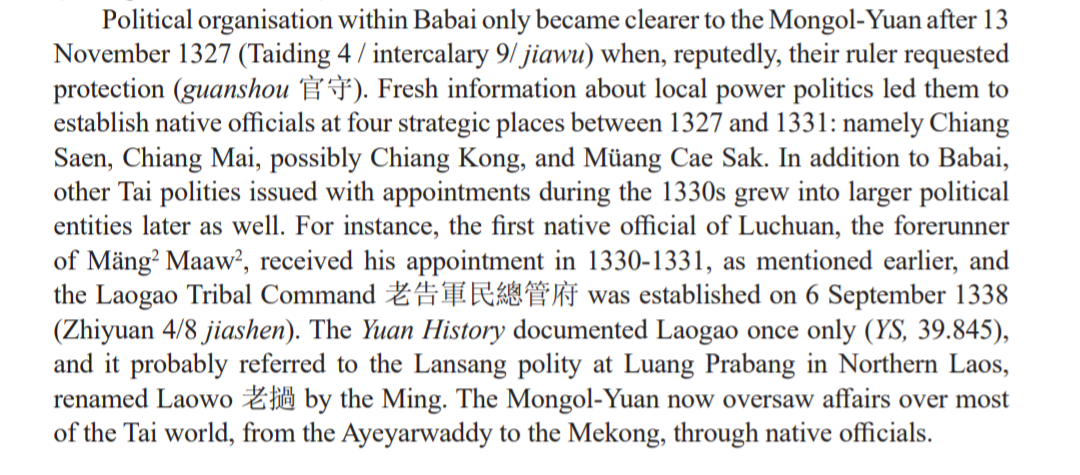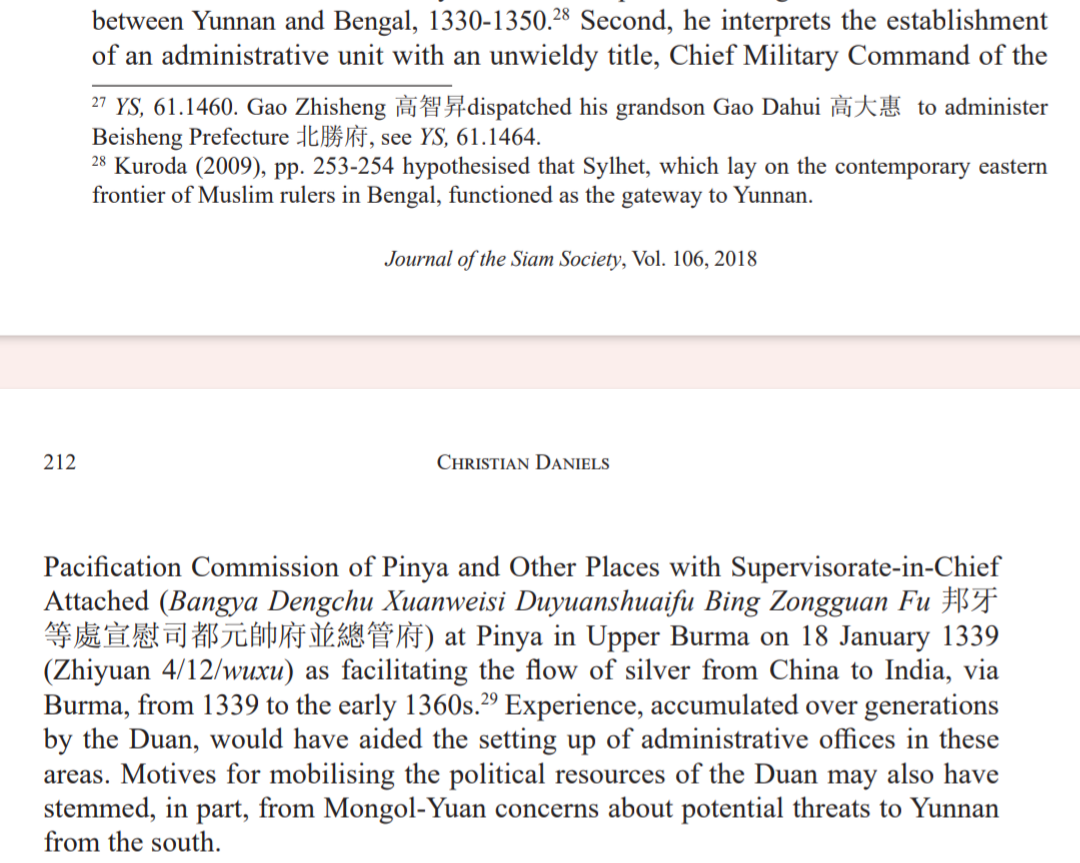Hello and welcome to another happy edition of our Wednesday Tinto Talks. This week we will continue our eastern focus with a look at the core mechanics related to China: The Middle Kingdom and a disaster related to it, the Influence of China.
The Middle Kingdom is represented in game with an International Organization, with the Celestial Emperor (or Huángdì) as its leader.
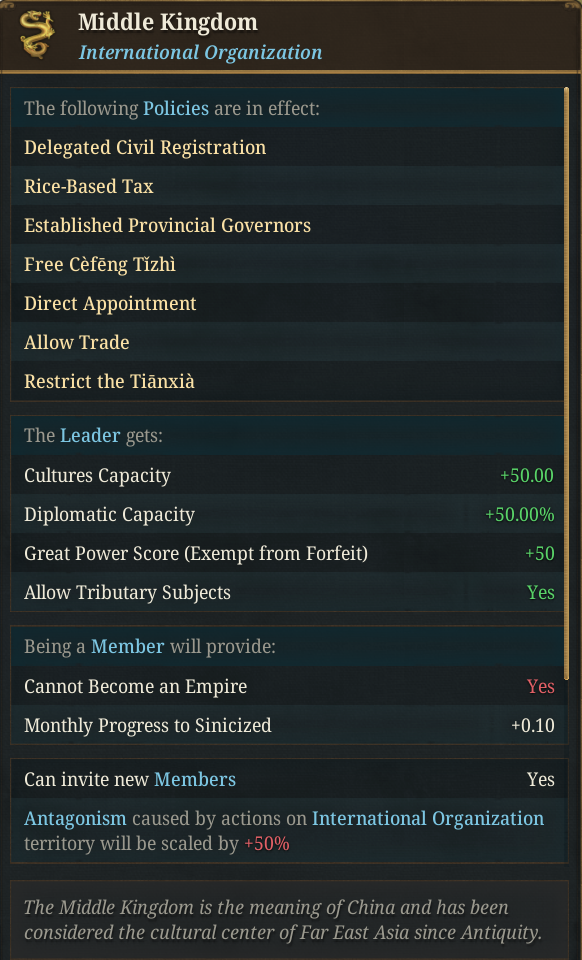
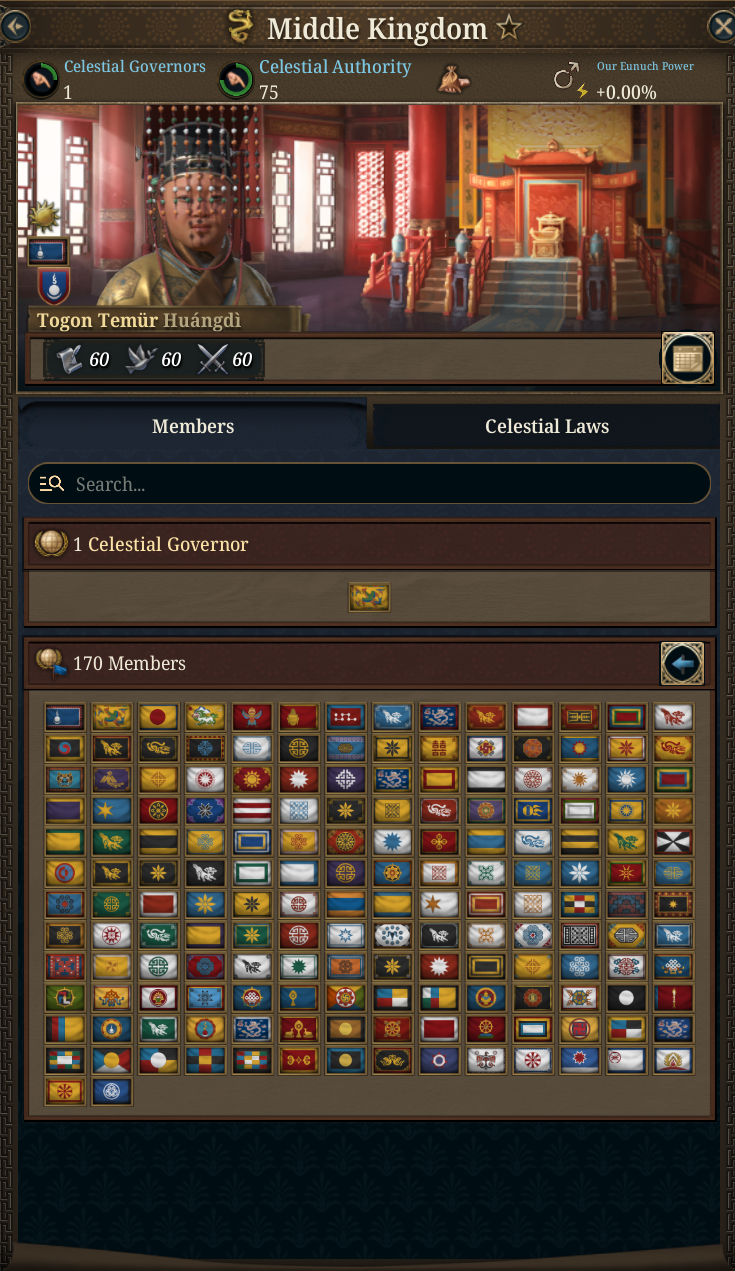
A usual, please consider all UI, 2D and 3D Art as WIP.
The IO itself has territory assigned to it, what it considers to be its core territory. In the mapmode, that’s represented by solid colors, when owned by a country inside the IO and purple stripes when not currently owned by a member of the IO.
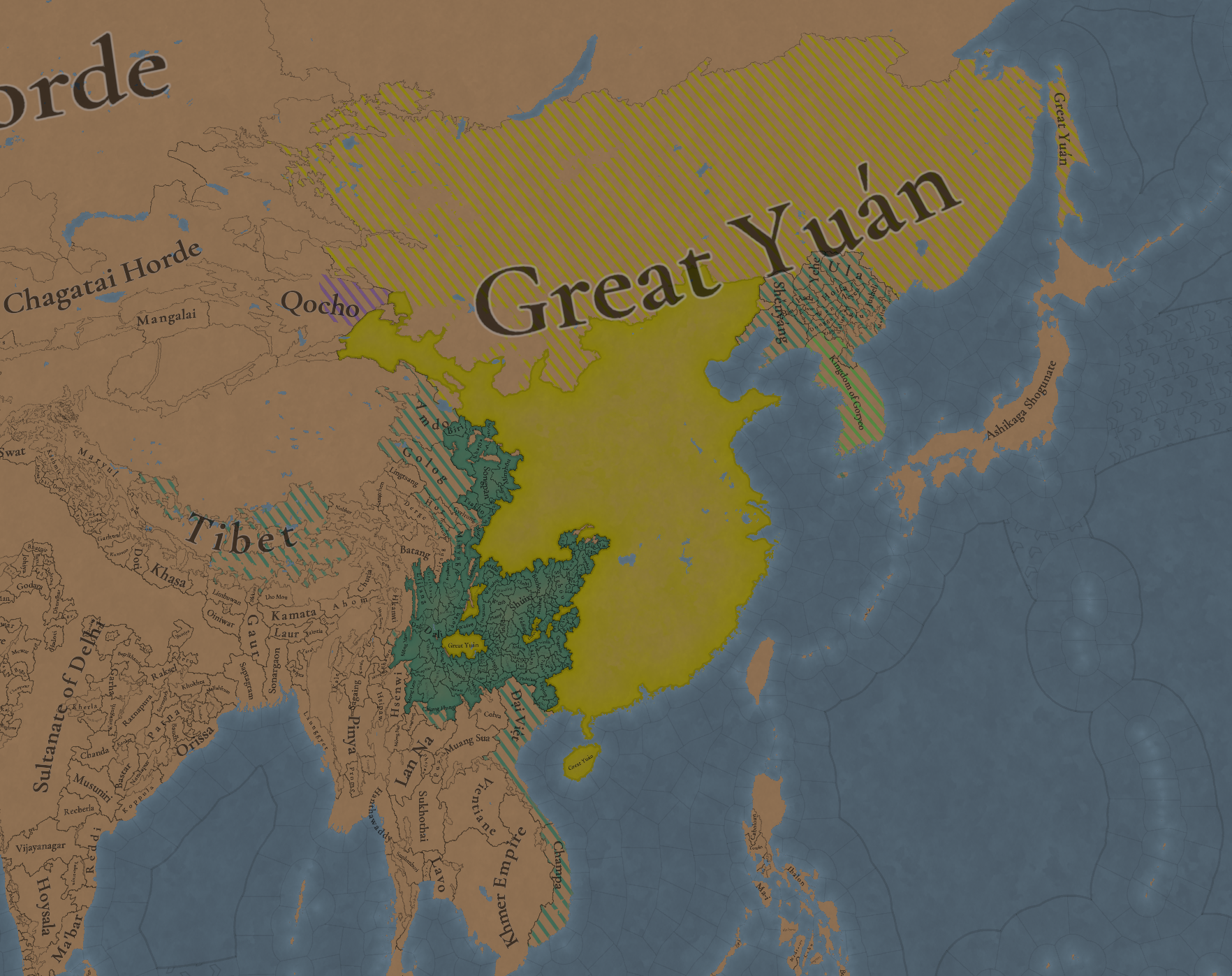
Territory outside the IO but owned by a member of it is colored in stripes of different colors: yellow for the Celestial Emperor, green for the regular members, and bright green for the Celestial Governors - these colors are WIP, and a matter of review, not final.
Speaking about that, what is a Celestial Governor? They are members of the Middle Kingdom to which the emperor has granted special privileges, giving them some nice bonuses:
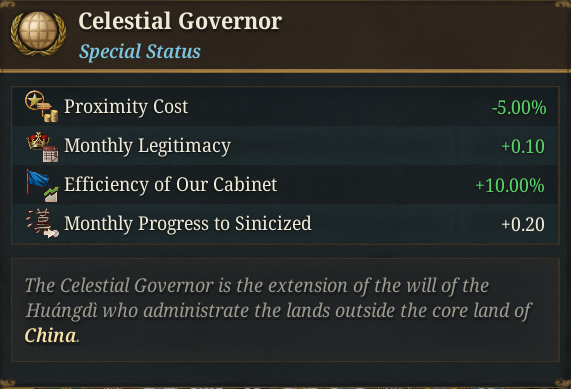
Countries can join the Middle Kingdom freely as long as they are not a subject, and either have their capital in Asia or have the appropriate cultural or religious groups. Subjects of the Celestial Emperor, however, will automatically join it.
Once a country is inside the Middle Kingdom, they will still be allowed to pursue their own diplomacy and wage their own wars (as long as they are not a subject type that forbids that), but they will also benefit from the protection of the Emperor, who may come to their assistance if they are attacked by an external threat (although that is not a guarantee). Also, they will be participating in the Tribute System.
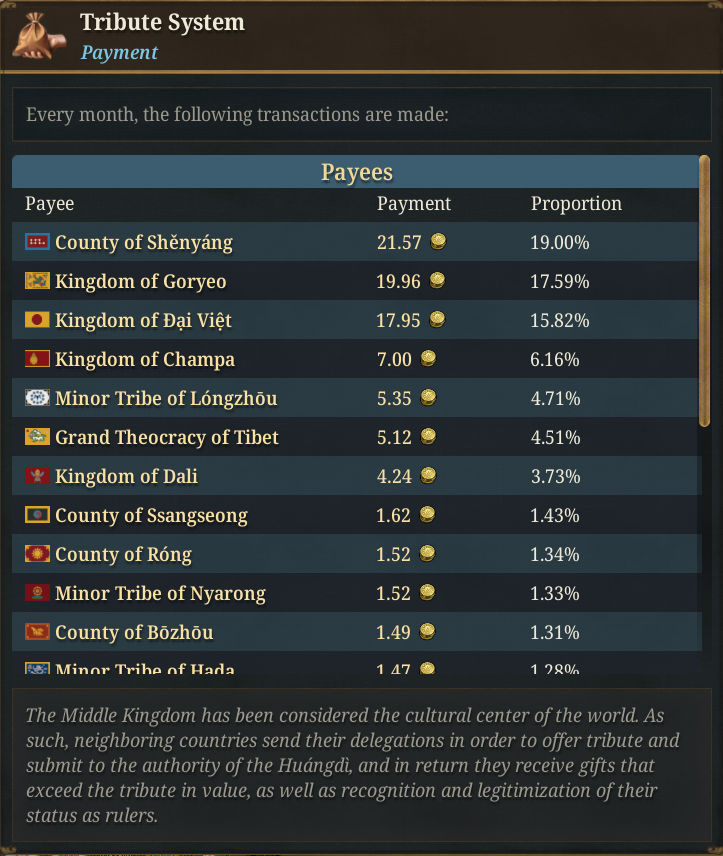
Historically, the tribute system of China was manifested through tribute missions between the various countries and the current ruling dynasty, conducted at various frequencies. Countries would offer gifts to the Emperor for the Son of Heaven to recognize their rule, and they would get gifts of greater value in return.
In the game, this back and forth is simplified and abstracted to a payment that the Emperor has to perform, and the resulting money is divided among all members, according to their economic power. The emperor gets a slider in their economic panel to determine exactly how much tribute they are willing to pay, at the risk of losing Celestial Authority if the resulting tribute is too low.

Celestial Authority does not have any passive effect, but there is much content tied to it, with some risks involved if let to fall too low. Additionally, many actions require the use of Celestial Authority:
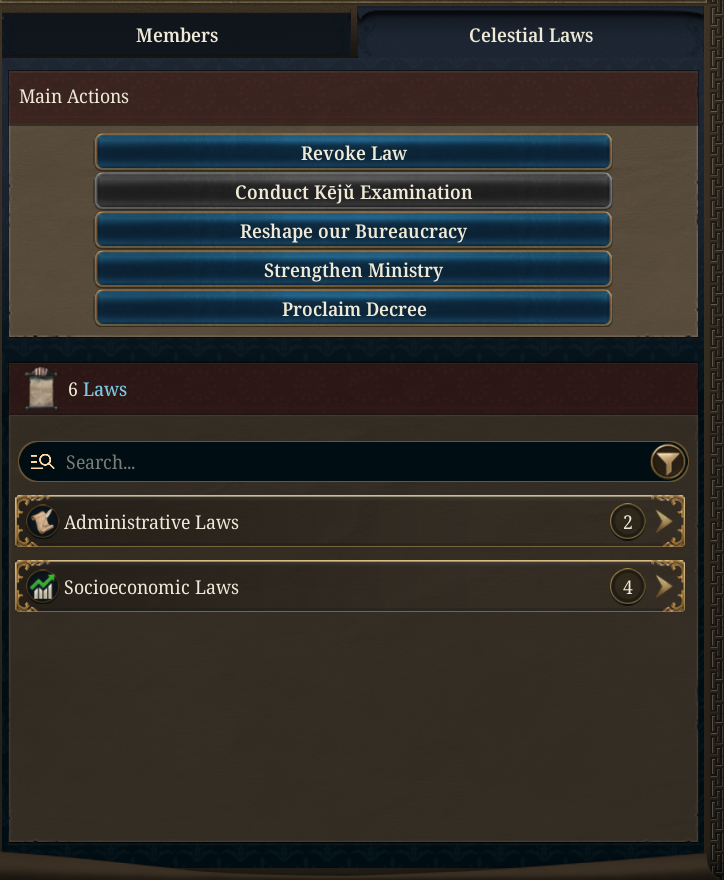
First off, let’s start talking about the Laws, as they define how the Middle Kingdom operates and also affect which actions will be available:

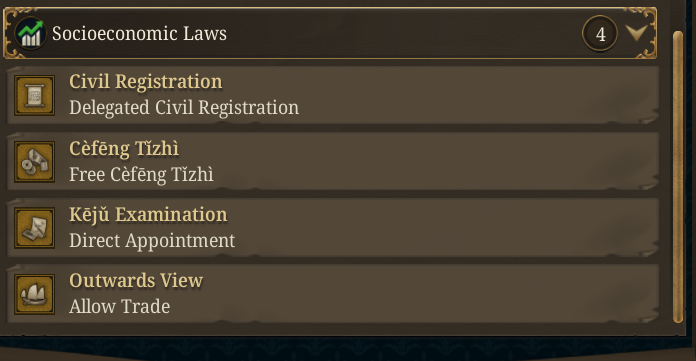
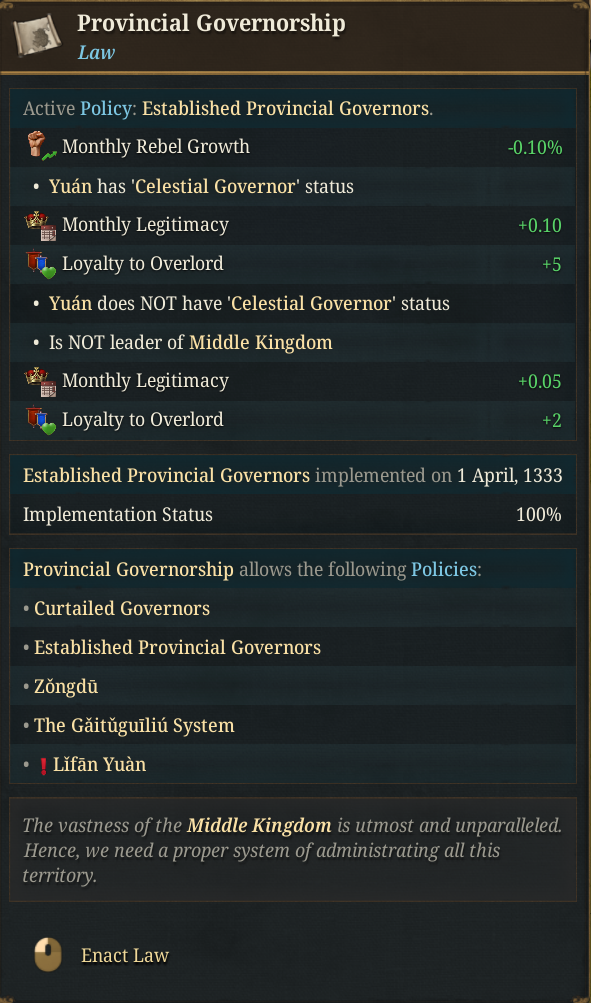
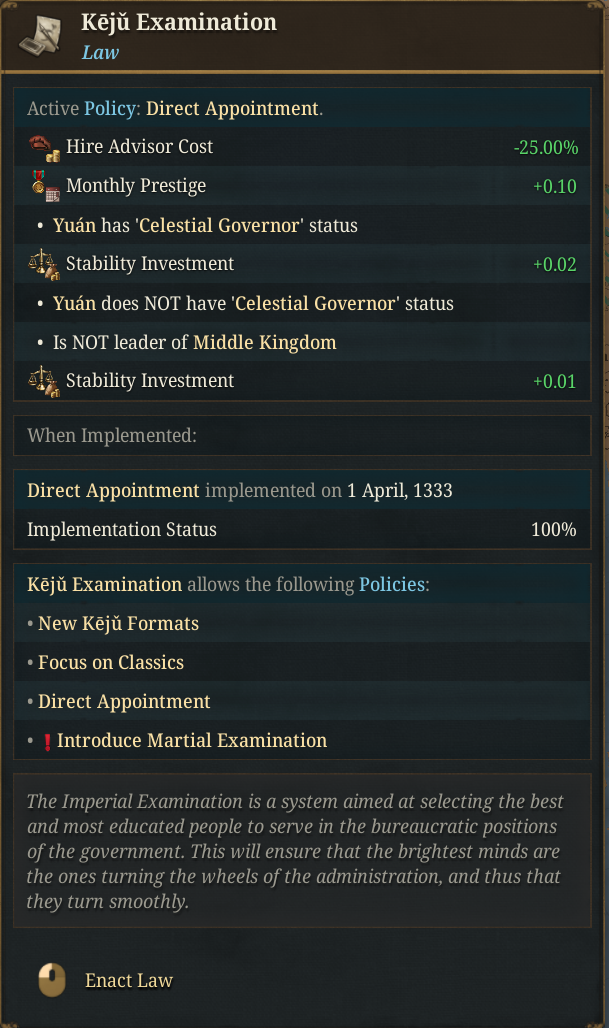
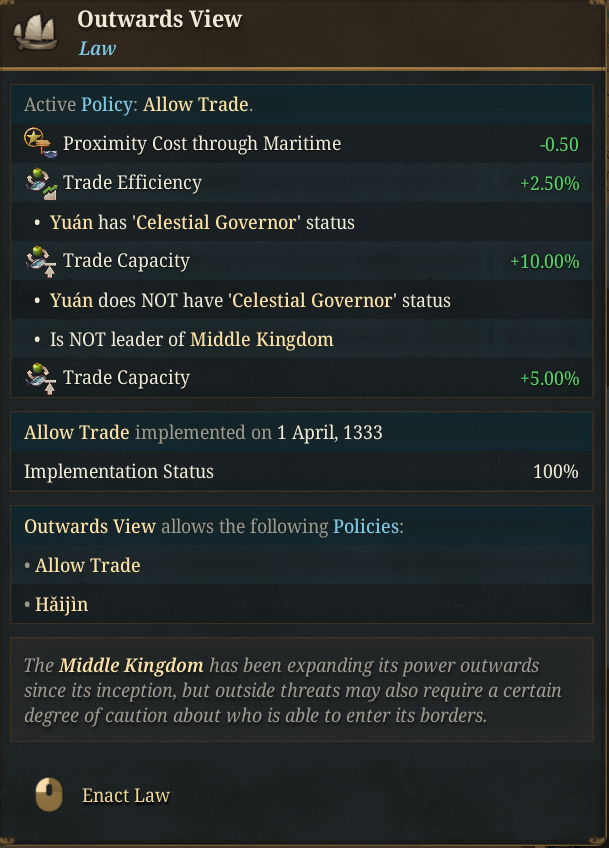
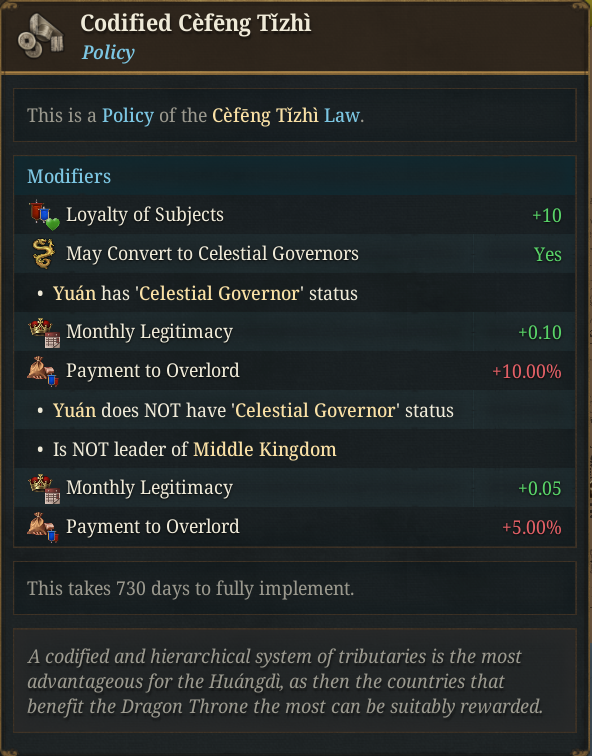
For example, ‘Conducting a Kējǔ Examination’ will only be possible as long as the ‘Direct Appointment’ policy is not active, while the appointment of new Celestial Governors can only be made if the ‘Codified Cèfēng Tǐzhì’ policy is active.
Let’s now look at the actions in more detail. For starters, as it was already mentioned, Conducting a Kējǔ Examination will allow the recruitment of a new capable character, with some historical characters being able to appear from it.
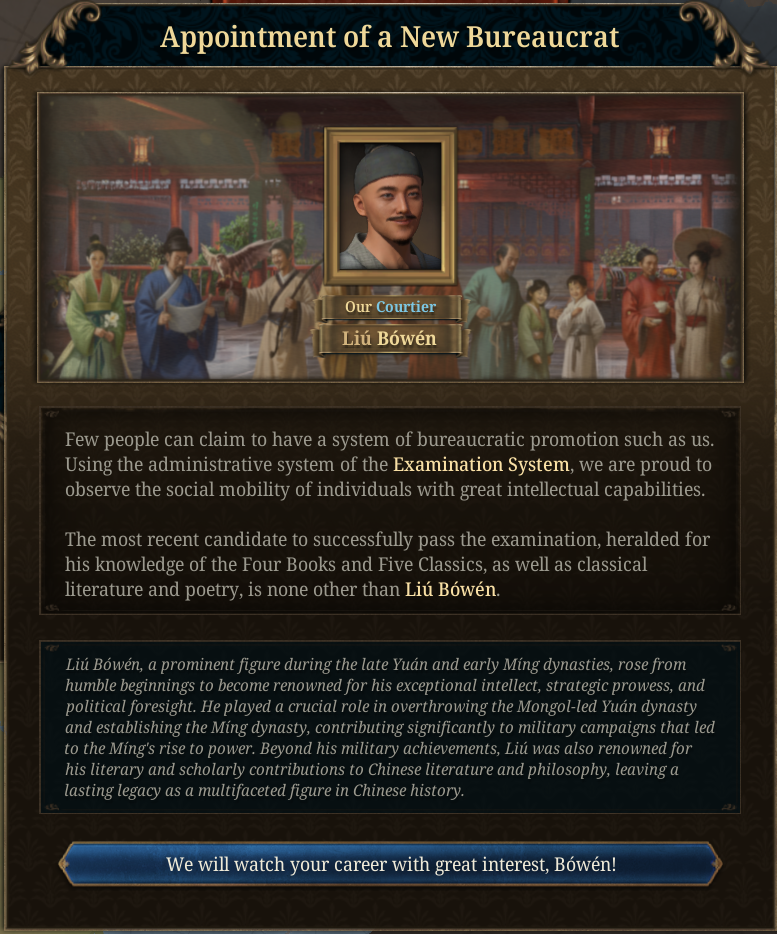
‘Strengthen Ministry’ will allow the country to strengthen one of the 6 traditional ministries in Chinese administration, with varying effects. Some ministries will also be available to affect the outcomes of other actions.
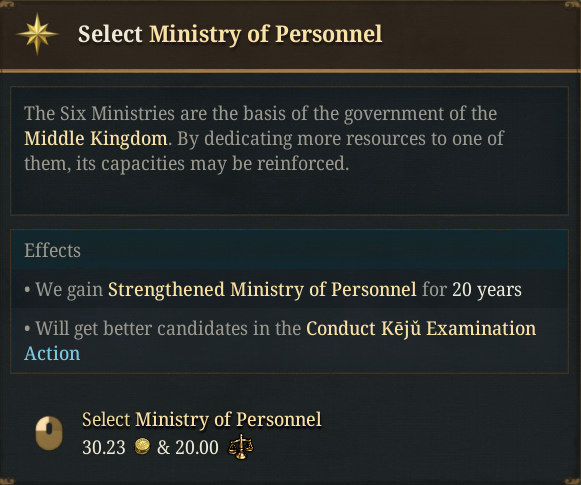
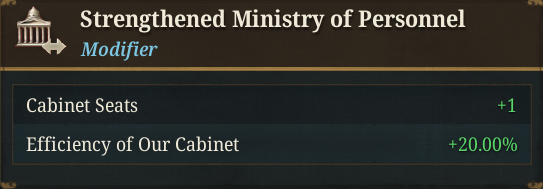
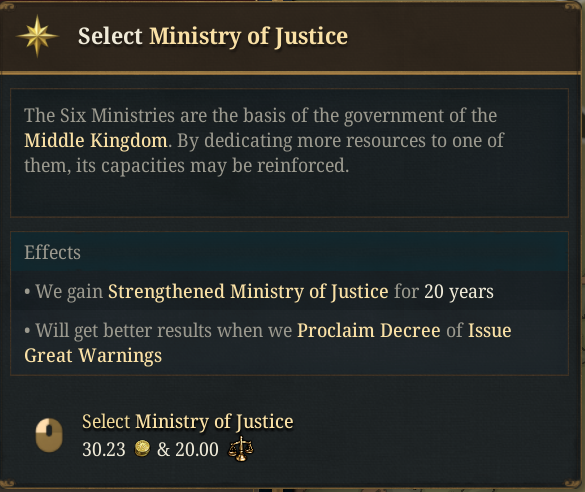
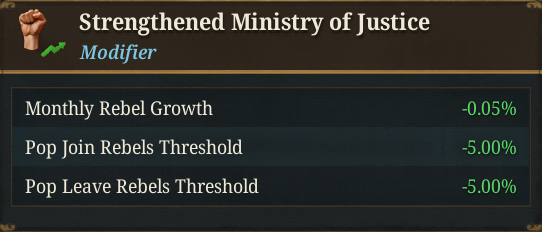
Lastly, the Proclaim Decree action will allow the emperor to choose a decree to enable for some temporary benefits, but it will also cost some Celestial Authority. The effects of the decrees last only for a short while, but are scaled by the amount of countries in the Middle Kingdom, the Emperor’s own Cabinet Efficiency, and other factors such as certain Ministries having been expanded.
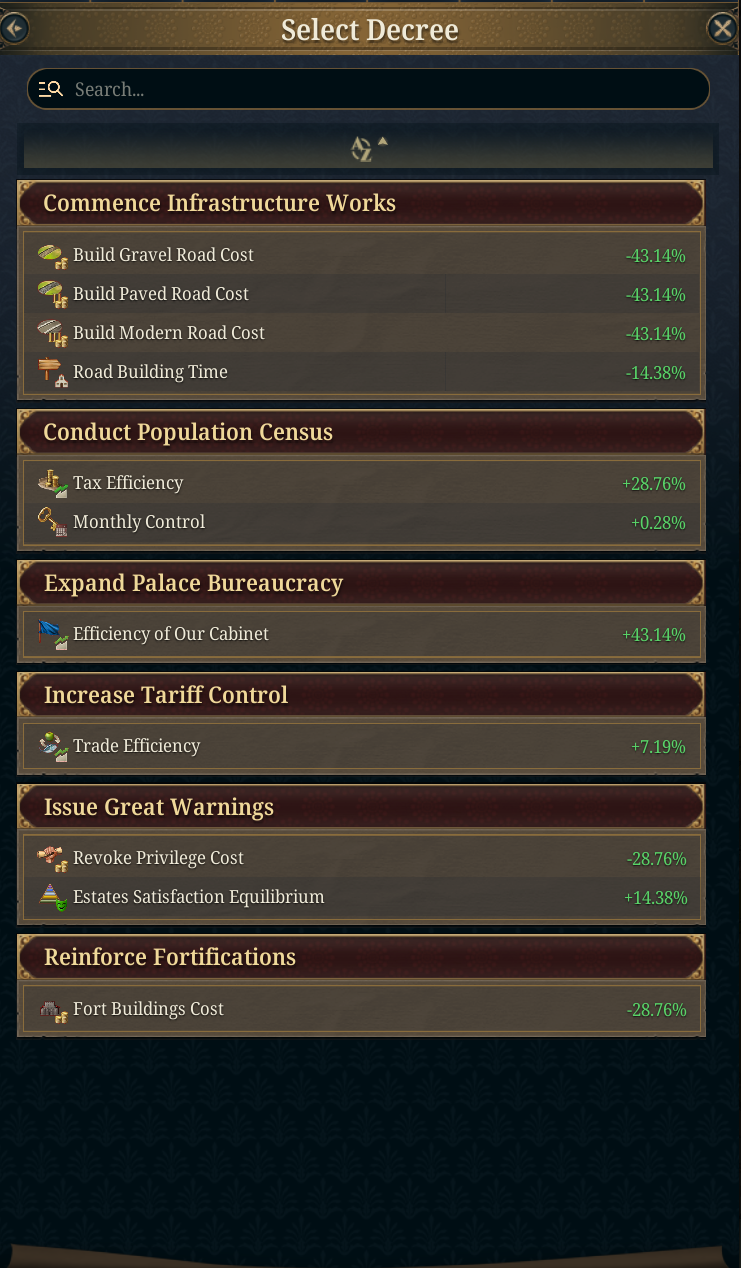
Additionally, the more decrees proclaimed, the less Celestial Authority that the Middle Kingdom will gain each month, representing the increasing complication of bureaucracy. However, the emperor can choose to ‘Reshape the Bureaucracy’, eliminating the accumulated penalty on Celestial Authority gain due to decrees.
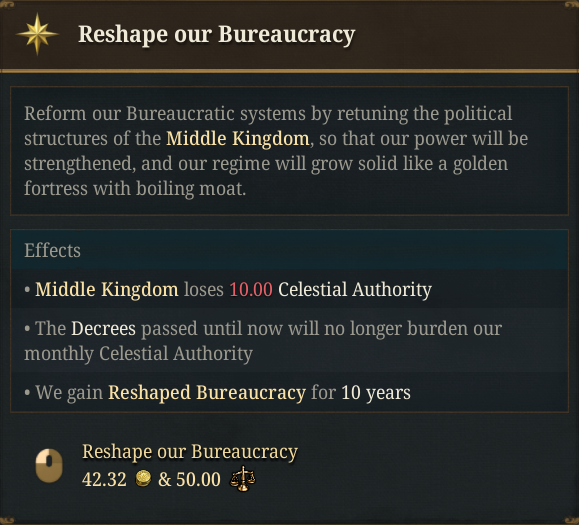
Another thing you may have noticed in the Middle Kingdom panel is something called Eunuch Power. At some point, China will have the option to empower the eunuchs. Doing so will open the gates to some events and effects related to them, but that will be for you to discover, as this Tinto Talks is already getting long enough, and I still have another topic to discuss - a new, unique Societal Value.
Let’s now move to take a look at China from the outside and see what happens when a foreign country interacts with it. If a country not belonging to the Chinese culture group enters the orbit of China, it will unlock the Sinicized vs Unsinicized societal value:
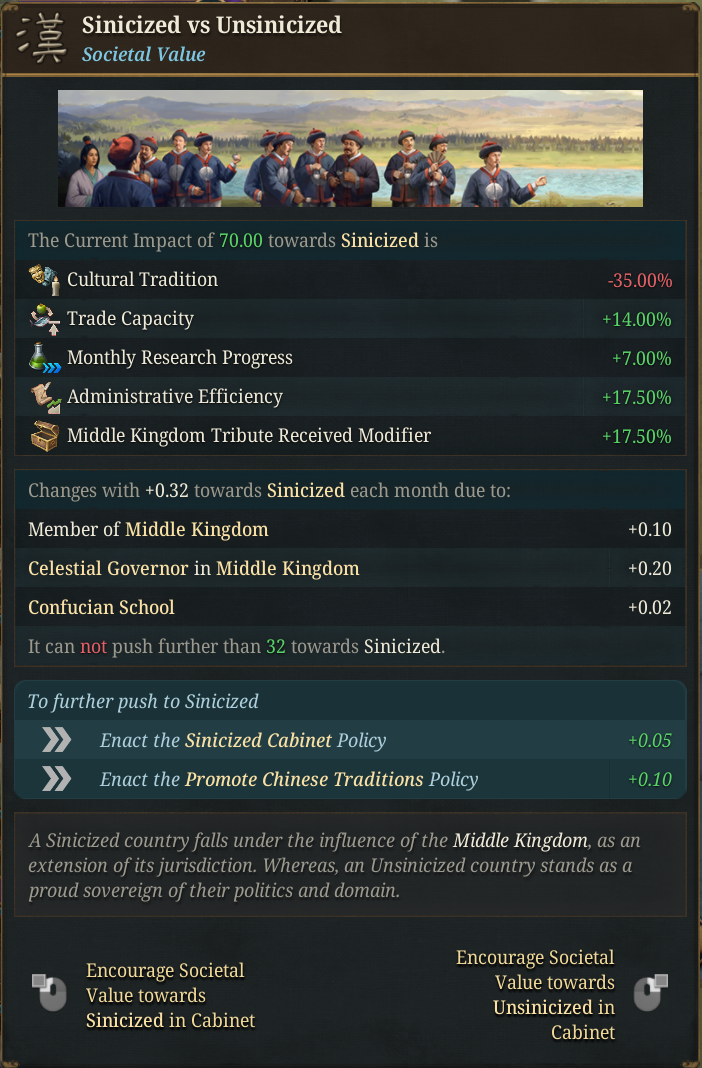
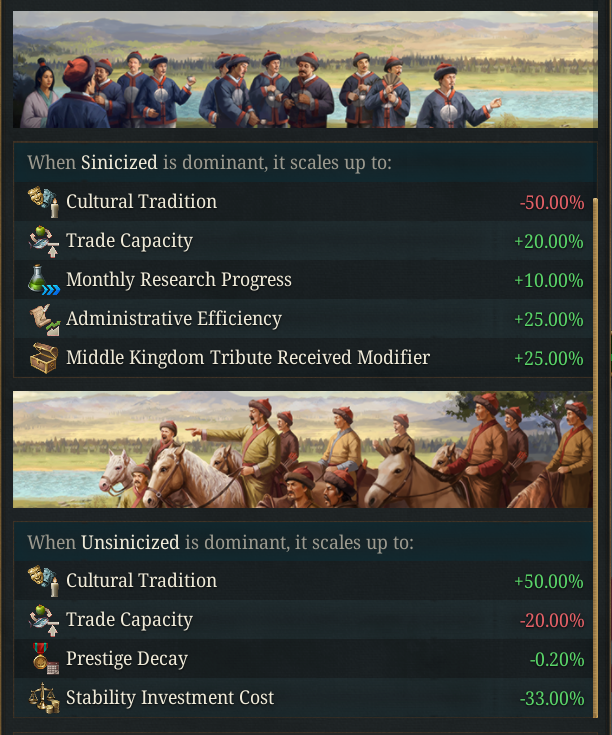
Like other societal values, a country has many tools with which to nudge it towards one extreme or the other. However, what matters to us today is what happens when they reach high levels of Sinicization. Any free country that goes beyond 90 towards Sinicization and is less powerful than China may fall under the ‘Influence of China’ disaster
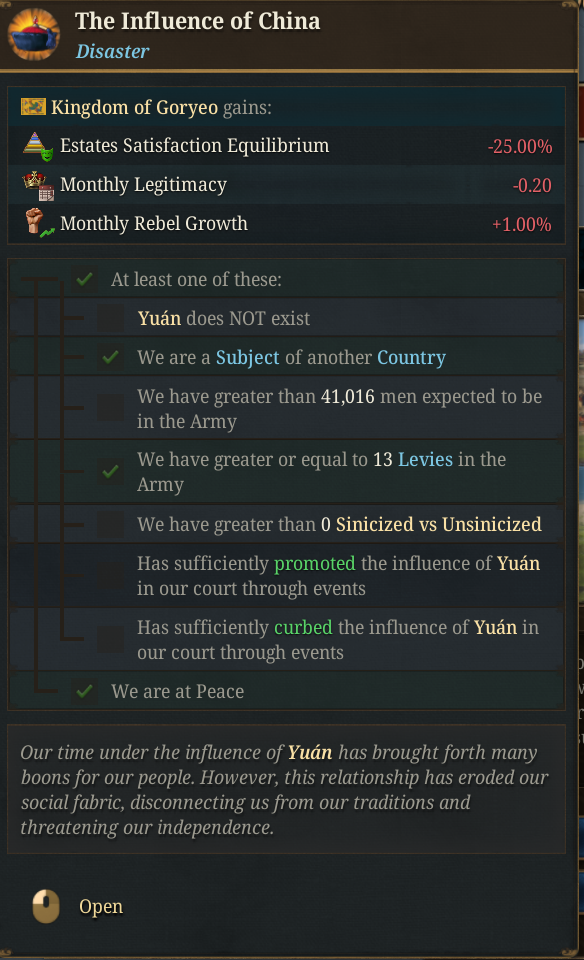
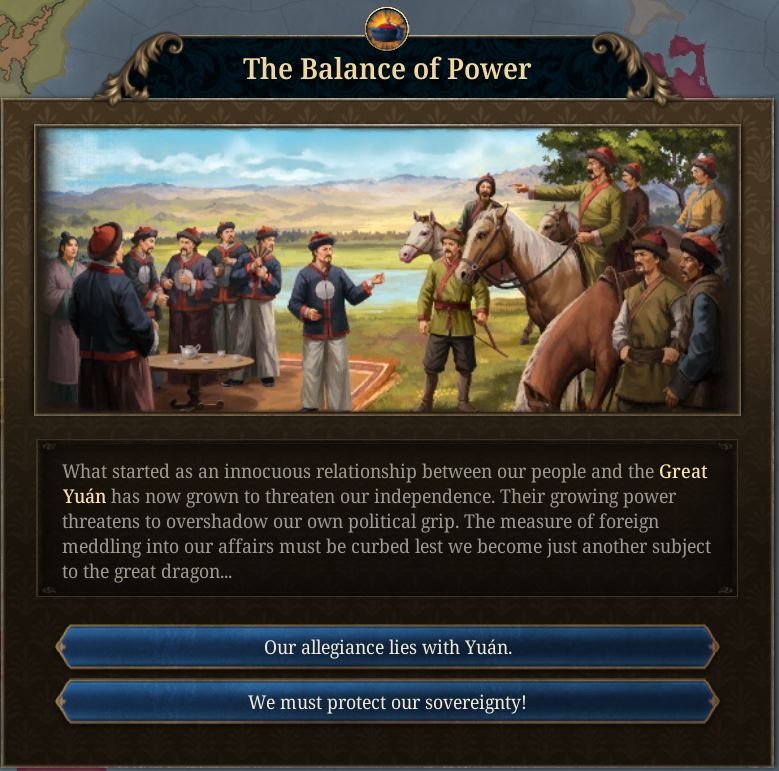
There will be many possible events firing during it, in which the country will navigate between continuing to be influenced by Chinese culture, or establishing its own cultural independence.
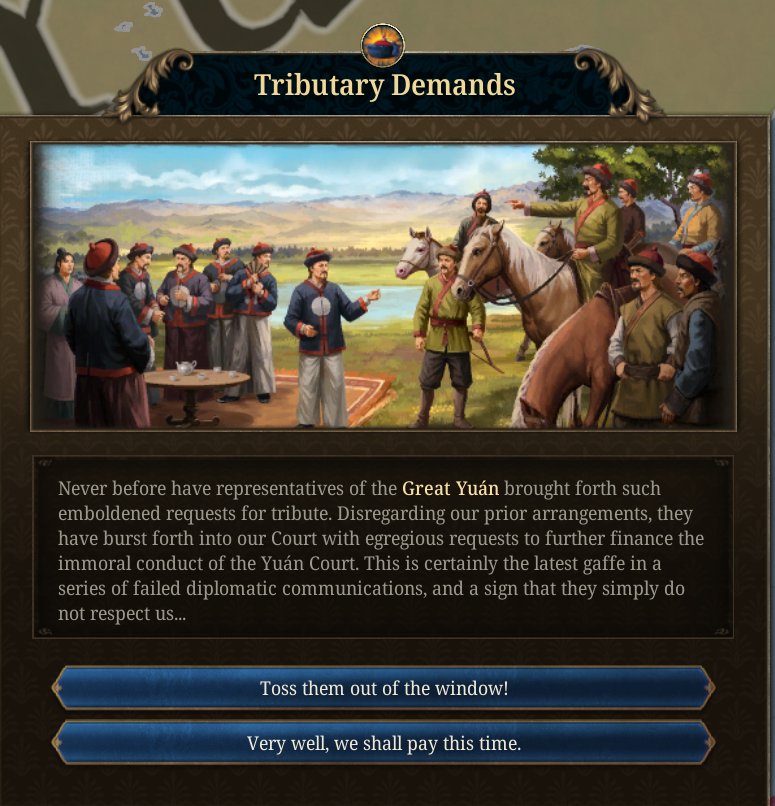
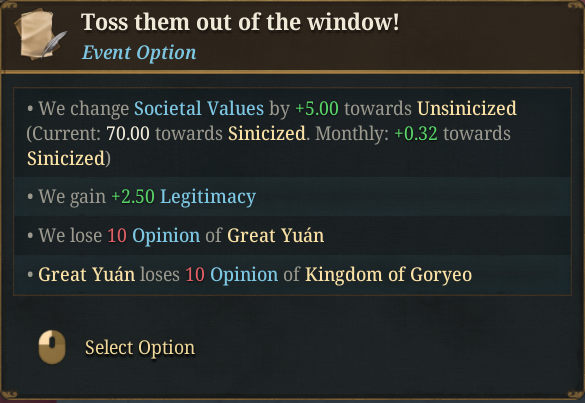
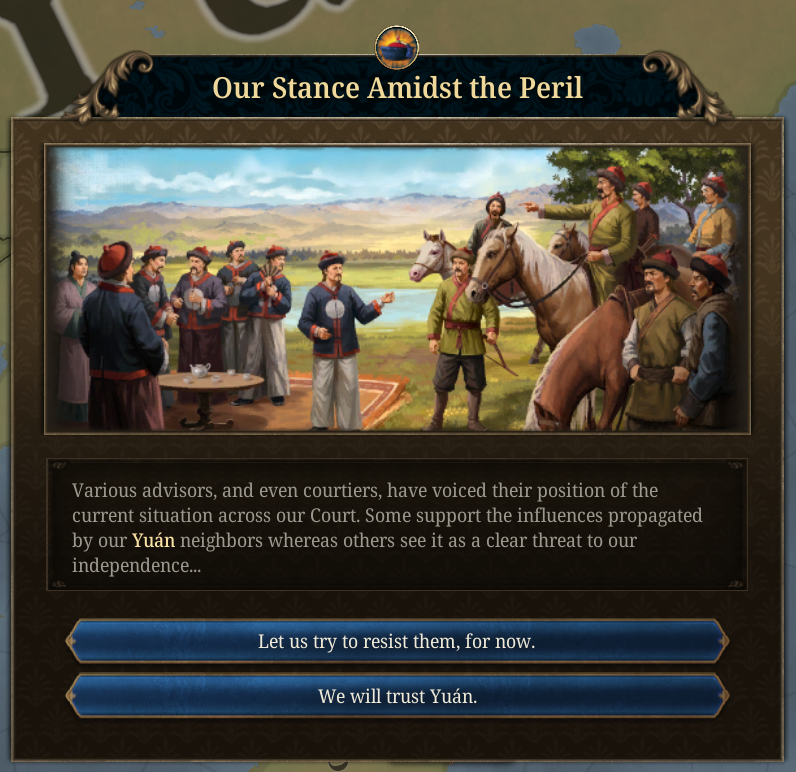
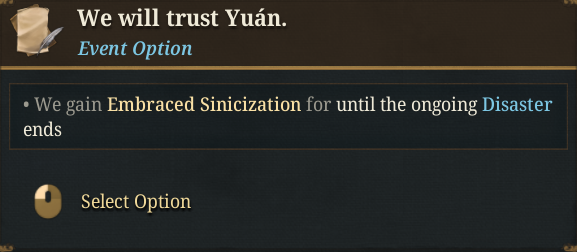
To get out of the disaster, the country has various options. For once, they will get out of it if they are no longer sinicized, there is not a China to which to compare them to, or they are already stronger than it. Alternatively, they can resolve the disaster via taking enough decisions towards the same direction in the events firing during it. When the disaster ends, a final event will fire, with options and results dependent on which exactly has been the way to exit the disaster.
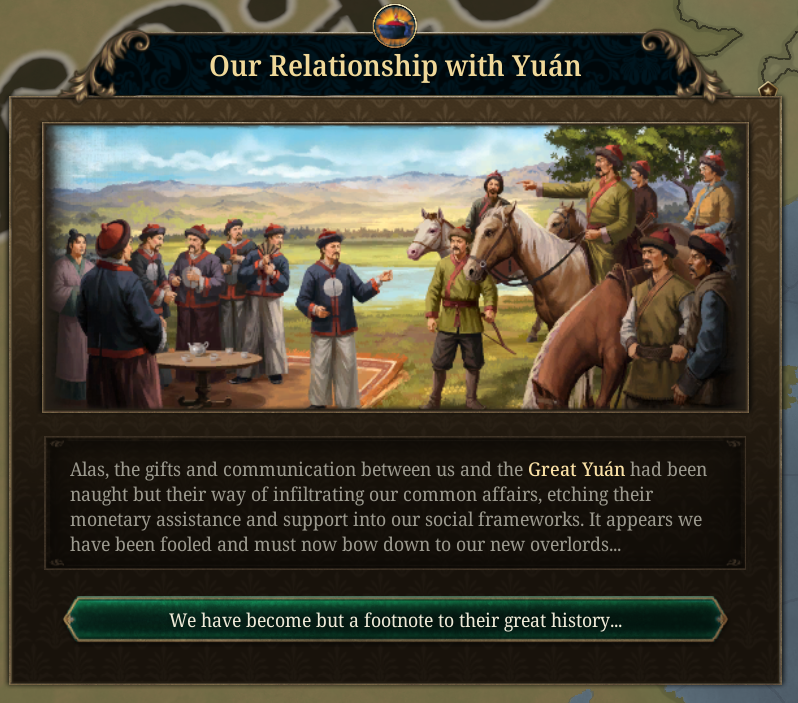
You’ll have to play through the disaster yourselves to see all the options though…
And that is all for today. On Friday we will continue with a Tinto Flavour about China, and in next Wednesday’s Tinto Talks, we’ll have the final puzzle piece for the Chinese content - the Red Turbans Rebellion situation, and the Crisis of the Chinese Dynasty disaster. We hope to see you on both!
And remember: Wishlist Europa Universalis V now!
The Middle Kingdom is represented in game with an International Organization, with the Celestial Emperor (or Huángdì) as its leader.


A usual, please consider all UI, 2D and 3D Art as WIP.

Speaking about that, what is a Celestial Governor? They are members of the Middle Kingdom to which the emperor has granted special privileges, giving them some nice bonuses:

Countries can join the Middle Kingdom freely as long as they are not a subject, and either have their capital in Asia or have the appropriate cultural or religious groups. Subjects of the Celestial Emperor, however, will automatically join it.
Once a country is inside the Middle Kingdom, they will still be allowed to pursue their own diplomacy and wage their own wars (as long as they are not a subject type that forbids that), but they will also benefit from the protection of the Emperor, who may come to their assistance if they are attacked by an external threat (although that is not a guarantee). Also, they will be participating in the Tribute System.

Historically, the tribute system of China was manifested through tribute missions between the various countries and the current ruling dynasty, conducted at various frequencies. Countries would offer gifts to the Emperor for the Son of Heaven to recognize their rule, and they would get gifts of greater value in return.
In the game, this back and forth is simplified and abstracted to a payment that the Emperor has to perform, and the resulting money is divided among all members, according to their economic power. The emperor gets a slider in their economic panel to determine exactly how much tribute they are willing to pay, at the risk of losing Celestial Authority if the resulting tribute is too low.

Celestial Authority does not have any passive effect, but there is much content tied to it, with some risks involved if let to fall too low. Additionally, many actions require the use of Celestial Authority:

First off, let’s start talking about the Laws, as they define how the Middle Kingdom operates and also affect which actions will be available:






For example, ‘Conducting a Kējǔ Examination’ will only be possible as long as the ‘Direct Appointment’ policy is not active, while the appointment of new Celestial Governors can only be made if the ‘Codified Cèfēng Tǐzhì’ policy is active.
Let’s now look at the actions in more detail. For starters, as it was already mentioned, Conducting a Kējǔ Examination will allow the recruitment of a new capable character, with some historical characters being able to appear from it.

‘Strengthen Ministry’ will allow the country to strengthen one of the 6 traditional ministries in Chinese administration, with varying effects. Some ministries will also be available to affect the outcomes of other actions.




Lastly, the Proclaim Decree action will allow the emperor to choose a decree to enable for some temporary benefits, but it will also cost some Celestial Authority. The effects of the decrees last only for a short while, but are scaled by the amount of countries in the Middle Kingdom, the Emperor’s own Cabinet Efficiency, and other factors such as certain Ministries having been expanded.

Additionally, the more decrees proclaimed, the less Celestial Authority that the Middle Kingdom will gain each month, representing the increasing complication of bureaucracy. However, the emperor can choose to ‘Reshape the Bureaucracy’, eliminating the accumulated penalty on Celestial Authority gain due to decrees.

Another thing you may have noticed in the Middle Kingdom panel is something called Eunuch Power. At some point, China will have the option to empower the eunuchs. Doing so will open the gates to some events and effects related to them, but that will be for you to discover, as this Tinto Talks is already getting long enough, and I still have another topic to discuss - a new, unique Societal Value.
Let’s now move to take a look at China from the outside and see what happens when a foreign country interacts with it. If a country not belonging to the Chinese culture group enters the orbit of China, it will unlock the Sinicized vs Unsinicized societal value:


Like other societal values, a country has many tools with which to nudge it towards one extreme or the other. However, what matters to us today is what happens when they reach high levels of Sinicization. Any free country that goes beyond 90 towards Sinicization and is less powerful than China may fall under the ‘Influence of China’ disaster


There will be many possible events firing during it, in which the country will navigate between continuing to be influenced by Chinese culture, or establishing its own cultural independence.




To get out of the disaster, the country has various options. For once, they will get out of it if they are no longer sinicized, there is not a China to which to compare them to, or they are already stronger than it. Alternatively, they can resolve the disaster via taking enough decisions towards the same direction in the events firing during it. When the disaster ends, a final event will fire, with options and results dependent on which exactly has been the way to exit the disaster.

You’ll have to play through the disaster yourselves to see all the options though…
And that is all for today. On Friday we will continue with a Tinto Flavour about China, and in next Wednesday’s Tinto Talks, we’ll have the final puzzle piece for the Chinese content - the Red Turbans Rebellion situation, and the Crisis of the Chinese Dynasty disaster. We hope to see you on both!
And remember: Wishlist Europa Universalis V now!



